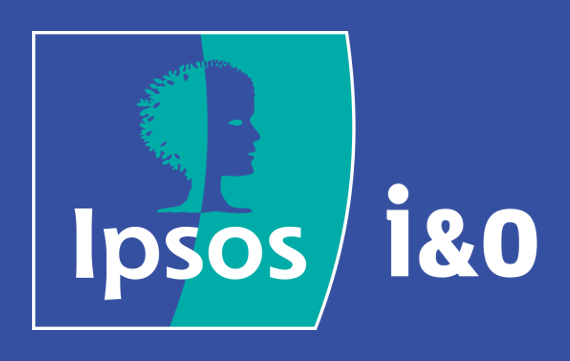International Women’s Day: attitudes to gender equality around the world
The first International Women’s Day in the Netherlands took place in 1912. Since then, greater attention is given to the needs, interests and beliefs of women worldwide. This day is a focal point in the movement for women’s rights, on which important themes like economic independence and equal participation are subject for debate. The aim is equal treatment of women and men and equality of opportunity internationally. In the context of International Women’s Day, Ipsos conducted research on the global attitudes to gender equality. How does the world think about this topic today?
In collaboration with the Global Institute for Women’s Leadership at King’s College London and International Women’s Day, Ipsos conducted a new global study between 21st of December 2018 and 4th of January 2019. An international sample of 18,800 adults were interviewed about their attitudes to relevant topics concerning gender equality. Read a summary of the results below or download the full report.
Women then and in society today
Globally, half (52%) believe there are more advantages to being a man than a woman in society today. Just over one in ten (12%) believe that being a woman is more advantageous than being a man. Men are more likely to say there is no difference than women (30% compared to 22%). On the other hand, half of the people globally say that young women will have a better life than women from their parents’ generation. There is still a long way to go, but attitudes are changing.
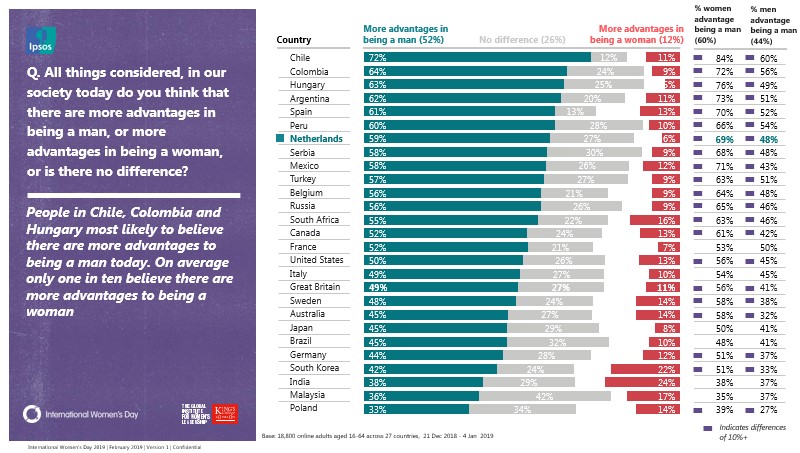
Attitudes to gender equality
Two-thirds of people globally (65%) say that achieving equality between men and women is important to them personally - although this has fallen five points since last year (70%). In the Netherlands, a quarter say they would describe themselves as a feminist compared to a global average of 33%.
In most countries, childcare is no longer seen as the preserve of the woman; three-quarters globally (75%) disagree that a man who stays at home to look after his children is less of a man compared with just one in five (18%) agreeing. In the Netherlands, 90% disagree with the statement. Furthermore, three-quarters of people globally (75%) say they would be comfortable with having a female boss. One in five men would be uncomfortable with this, while 14% of the women share this opinion. The Netherlands is in the second-to-last place; only 8% say they would feel uncomfortable.
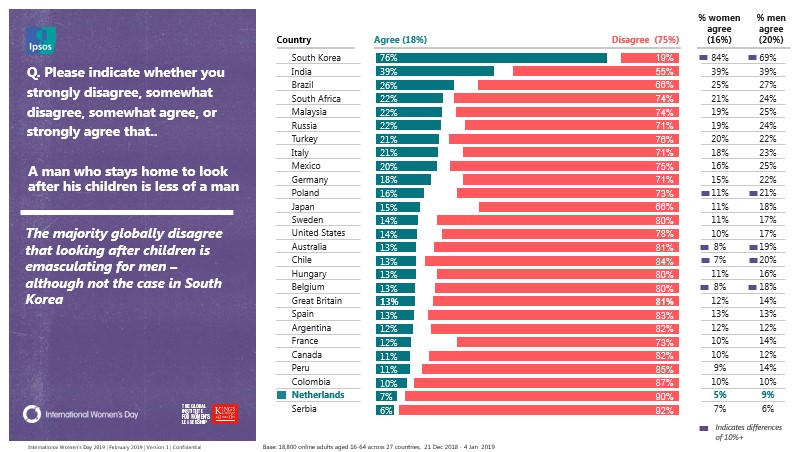
Men’s role in equality
Two-thirds believe that women won’t achieve equality in their country unless men take actions to support women’s rights too. However, opinion is split on whether too much is being expected of men to help the fight for equality: 43% agree that men are being expected to do too much compared to 46% who disagree. Only 24% of Dutch people think that too much is being expected of men to support women’s equality.
Issues facing women
Women still face significant issues. Sexual harassment, sexual violence, physical violence, equal pay and domestic abuse are still seen as the top issues facing women across the globe. In the Netherlands, equal pay is seen as the top issue (33%), followed by sexual harassment (30%) and balancing work and caring responsibilities (24%).
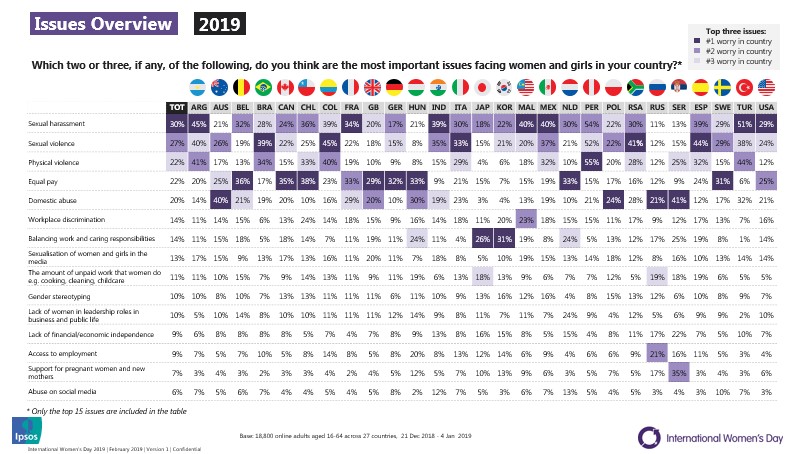
Actions for change
Globally, the top actions that people feel would help to achieve equality between men and women are employers paying women the same as men for the same work (36%) and tougher laws to prevent violence and harassment against women (35%). In the Netherlands, equal pay is picked out as an important action by 49% of the people. In most countries, women are significantly more likely than men to mention equal pay.
Achieving gender equality
Close to half (48%) believe that the area of life where not enough is being done to achieve equal rights between men and women is looking after children and the home, followed by business (46%) and government and politics (44%). People in the Netherlands are mainly negative about business: 58% believe that not enough is being done to achieve equal rights in the corporate world, compared to a global average of 46%.
The prospects for gender equality
Education is the area where people think equality will be achieved first - close to half (47%) are confident that discrimination against women in education will have ended in 20 years’ time. Compared to other areas of life, the people in the Netherlands are most optimistic about discrimination in education (58%) being ended and least confident about this happening in the corporate world (47%) in the next twenty years.
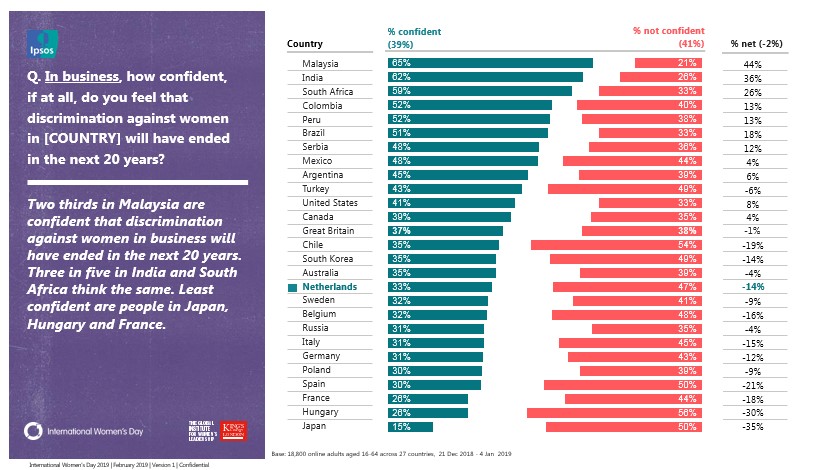
Gender equality is a fundamental human right, but there is still a long way to go to achieve full equality between men and women worldwide. Greater attention is given to the needs, interests and beliefs of women and to people all over the world who work for gender equality since International Women’s Day is brought to life. Here’s to women!
Interested in all the results? Download the full report here.
Technical details
- Field dates were Friday, December 21st, 2018 to Friday, January 4th, 2019.
- 16 of the 27 countries surveyed online generate nationally representative samples in their countries (Argentina, Australia, Belgium, Canada, France, Germany, Great Britain, Hungary, Italy, Japan, Netherlands, Poland, South Korea, Spain, Sweden, and United States).
- Brazil, Chile, Colombia, India, Malaysia, Mexico, Peru, Russia, Serbia, South Africa and Turkey produce a national sample that is more urban & educated, and with higher incomes than their fellow citizens. We refer to these respondents as “Upper Deck Consumer Citizens”. They are not nationally representative of their country.
- Approximately 1,000+ individuals participated on a country-by-country basis via the Ipsos Online Panel, with the exception of Argentina, Belgium, Chile, Colombia, Hungary, India, Malaysia, Mexico, the Netherlands, Peru, Poland, Russia, Serbia, South Africa, South Korea, Sweden and Turkey, where each have a sample of approximately 500+.
